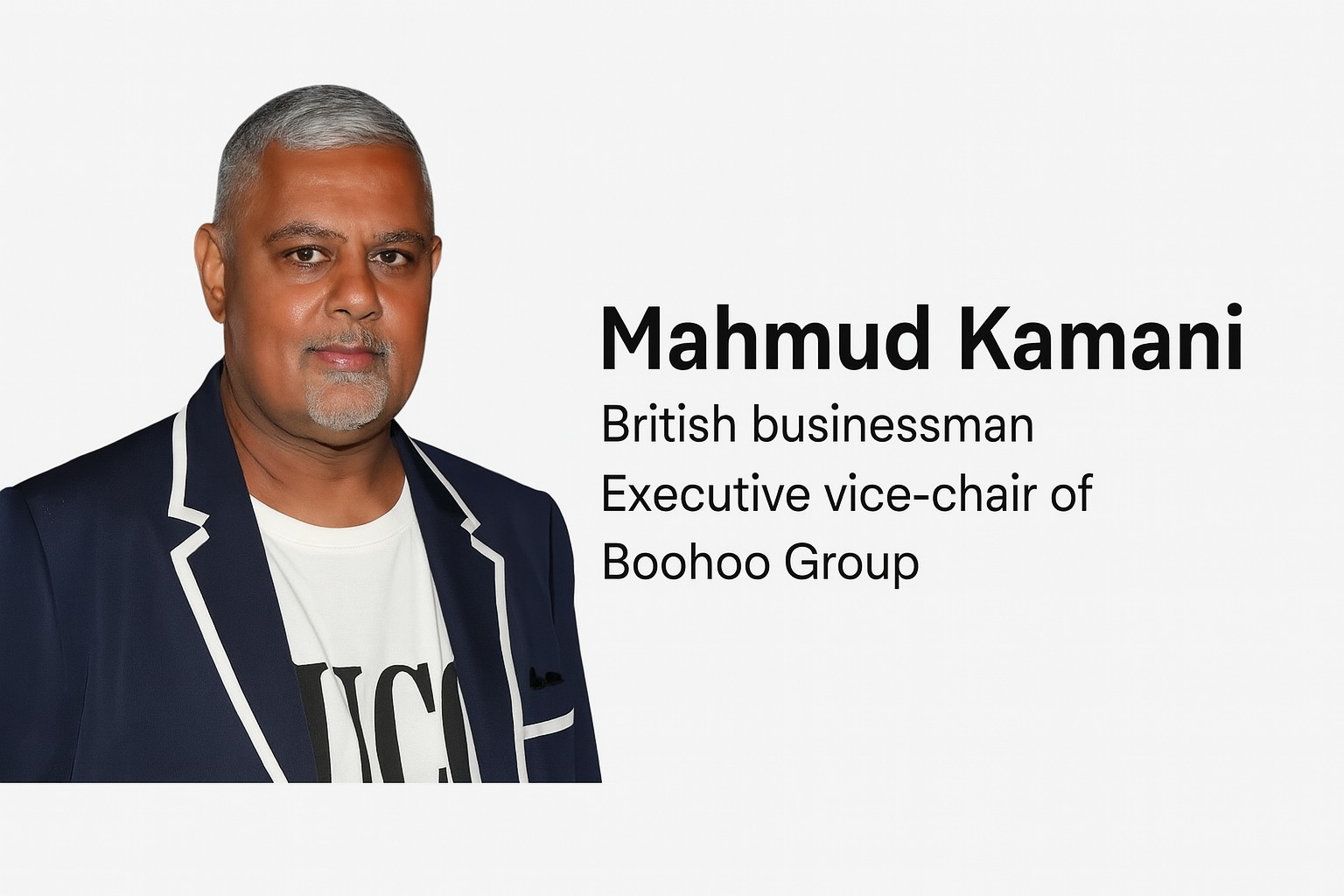Mahmud Kamani: The Billionaire Behind Boohoo’s Fast-Fashion Revolution
How Mahmud Kamani Transformed a Market Stall Legacy into a Global Fashion Empire

Introduction
Mahmud Kamani, a self-made mogul and pioneer of online retail, has become a central figure in the UK’s fast-fashion landscape. As the executive vice-chair of Boohoo Group, he is recognised for steering one of Britain’s most prominent e-commerce success stories. From a market stall in Manchester to a £1 billion net worth, Kamani’s journey is one of resilience, vision, and bold innovation.
With a rich Indian-Kenyan heritage and a deep understanding of retail dynamics, Mahmud Abdullah Kamani exemplifies the modern entrepreneur who blends cultural legacy with commercial foresight. This article offers an in-depth look into his life, achievements, challenges, and influence in shaping fashion’s digital era.
Early Life and Background
Heritage and Family Business Roots
Born in August 1964 in Kenya, Mahmud Kamani’s lineage traces back to Gujarat, India. His father, Abdullah Kamani, relocated the family to northwest England in the late 1960s. Settling in Chorlton, Abdullah started a textile supplier business from a small market stall, selling handbags and garments to local customers.
Growing up in a working-class household, Mahmud was immersed in the hustle and grit of family-run commerce. His early exposure to supply chains, pricing, and customer service would later define his corporate strategy.
The Launch of Boohoo
Co-Founding Boohoo with Carol Kane
In 2006, Mahmud Kamani partnered with fashion professional Carol Kane to launch Boohoo Group, a digitally native brand aimed at delivering affordable, trend-led fashion directly to consumers. Their goal was to disrupt traditional retail by cutting out the middleman and leveraging e-commerce platforms to build brand loyalty.
Kamani and Kane’s combined vision tapped into the lifestyle of tech-savvy Gen Z and millennial audiences. Boohoo became a symbol of fast fashion done fast, effectively reducing the turnaround time from design to delivery.
Boohoo’s Growth and Acquisitions
IPO and Rapid Market Expansion
In 2014, Boohoo went public with an IPO valuation of approximately £560 million, marking one of the most successful UK e-commerce listings of the decade. The capital raised accelerated expansion, allowing Boohoo to acquire other fast-growing fashion labels.
Major Brand Acquisitions
Under Kamani’s direction, Boohoo acquired:
-
PrettyLittleThing (co-founded by Umar Kamani and Adam Kamani, Mahmud’s sons)
-
Nasty Gal
-
Miss Pap
-
Former Arcadia brands: Dorothy Perkins, Wallis, and Burton
These acquisitions transformed Boohoo into a multi-brand fashion group, targeting diverse segments across the youth fashion market.
Controversies and Criticisms
Leicester Factories and Underpaid Workers
Despite impressive growth, Boohoo’s supply chain was marred by controversy. In 2020, investigative reports revealed that garment workers in Leicester factories were paid as little as £3.50/hour. This pandemic supply-chain scandal triggered significant backlash, raising questions about Boohoo’s ethical standards.
Kamani faced scrutiny and launched internal reviews to address supply-chain ethics, introduce supplier audits, and improve transparency across operations. The brand committed to reform, although reputational damage lingered.
Governance Disputes with Frasers Group
In 2024–2025, Boohoo’s governance was challenged by Mike Ashley‘s Frasers Group, which demanded the removal of Mahmud Kamani from the board. Accusations included undisclosed payments and concerns about transparency.
However, in a dramatic boardroom dispute, 63.2% of shareholders voted in Kamani’s favour. With support from new leaders like Tim Morris (Chair) and Dan Finley (CEO), Kamani retained his role, highlighting his lasting influence within the organisation.
Leadership Style and Business Vision
Strategic Pivot and Marketplace Ambitions
Mahmud Kamani is now focused on evolving Boohoo from a pure fashion retailer into a broader online marketplace model, using the Debenhams rebrand as a key catalyst. The aim is to offer third-party products alongside own brands, enhancing customer choice and resilience in a competitive market.
This strategic pivot reflects Kamani’s agility and willingness to adapt, hallmarks of his leadership style.
Personal Life and Family
Private Persona with Deep Family Ties
Kamani lives a relatively low-profile life in Mottram St Andrew, Cheshire. He is married to Aisha Kamani, and together they have three sons: Umar, Adam, and Samir Kamani. His sons are active in fashion and lifestyle ventures, carrying forward the family’s commercial legacy.
Although he avoids the limelight, Kamani maintains an Instagram presence, offering rare glimpses into his business world.
Philanthropy and Social Causes
A strong supporter of giving back, Kamani is affiliated with the Kibera Kids charity in Nairobi, aiding children in disadvantaged communities. His family’s £15 million fundraising contribution in 2024 further reflects their investment in Boohoo’s long-term success.
Achievements and Recognition
Industry Honours
Kamani has been widely recognised for his entrepreneurial accomplishments:
-
Entrepreneur of the Year (2013)
-
Legends of Industry Award (2015)
His net worth, estimated at over £1 billion, cements his status among the UK’s most successful British businessmen. His contributions to the Manchester fast-fashion dynasty have left a lasting legacy on UK retail.
Future Outlook
With the rebranding of Boohoo under the Debenhams name and a renewed focus on marketplace innovation, Kamani is looking to diversify revenue streams and future-proof the business. The aim is to stay competitive amidst rising sustainability demands and shifting consumer expectations.
Frequently Asked Questions (FAQ)
Who is Mahmud Kamani?
Mahmud Kamani is a British businessman and the executive vice-chair of Boohoo Group, known for co-founding the company in 2006.
Where is Mahmud Kamani from?
He was born in Kenya in 1964, with roots in Gujarat, India, and later moved to northwest England.
What is his net worth?
As of recent estimates, Kamani’s net worth is around £1 billion.
What brands has Boohoo acquired?
Major acquisitions include PrettyLittleThing, Nasty Gal, Miss Pap, Dorothy Perkins, Wallis, and Burton.
What was the Frasers Group dispute?
Frasers Group, led by Mike Ashley, attempted to oust Kamani from Boohoo’s board over governance concerns, but shareholders supported Kamani’s retention.
What’s next for Boohoo?
The brand is transitioning toward a marketplace model under the Debenhams umbrella, reflecting Kamani’s new strategic direction.
Conclusion
Mahmud Kamani’s story is more than a business success—it’s a reflection of immigrant ambition, modern entrepreneurship, and adaptability in an ever-changing retail landscape. As Boohoo continues to evolve, Kamani’s influence on the UK retail and fashion industry remains indisputable. His blend of heritage, hustle, and leadership makes him a true architect of Britain’s fast-fashion empire.



